完整word版,上海牛津英语五年级下册语法点整理
沪教牛津版五年级英语下册全册知识点汇总清单
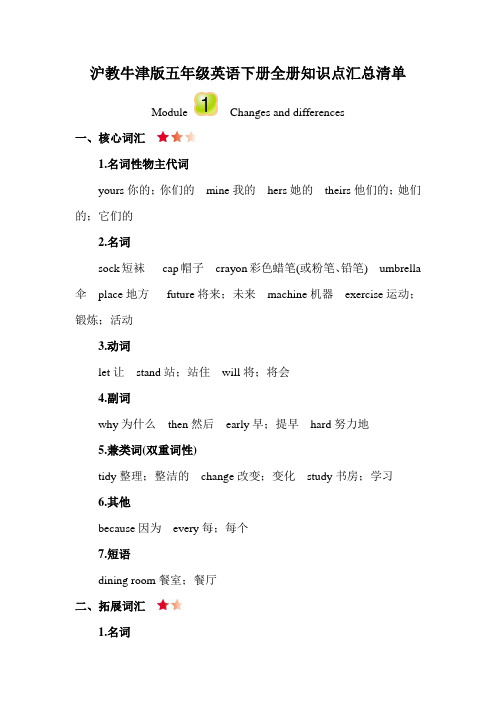
沪教牛津版五年级英语下册全册知识点汇总清单Module Changes and differences一、核心词汇1.名词性物主代词yours你的;你们的mine我的hers她的theirs他们的;她们的;它们的2.名词sock短袜cap帽子crayon彩色蜡笔(或粉笔、铅笔)umbrella 伞place地方future将来;未来machine机器exercise运动;锻炼;活动3.动词let让stand站;站住will将;将会4.副词why为什么then然后early早;提早hard努力地5.兼类词(双重词性)tidy整理;整洁的change改变;变化study书房;学习6.其他because因为every每;每个7.短语dining room餐室;餐厅二、拓展词汇1.名词nail钉子second秒(时间单位)mess脏乱;不整洁2.动词drop使落下;掉落stick粘贴;粘住3.形容词enough足够的more更多的4.副词twice两次easily容易地5.兼类词(双重词性)north北方;向北south南方;向南6.短语tidy up把……整理好(be) full of装满……;充满…… a few几个;一些wild goose大雁(复数wild geese) in the future将来in front of在……前面take a photo拍照wear glasses戴眼镜(be)weak in不擅长not …any more不再all day一天到晚do exercise做运动三、核心句型1.—Are they yours?它们是你的?—No,they aren’t. 不,它们不是。
解读: 问句是一个一般疑问句,用来询问某物的归属,有肯定和否定两种回答。
举一反三: —Are these crayons yours?这些蜡笔是你的吗?—No,they aren’t. 不,它们不是。
牛津英语五年级下册知识点精编WORD版
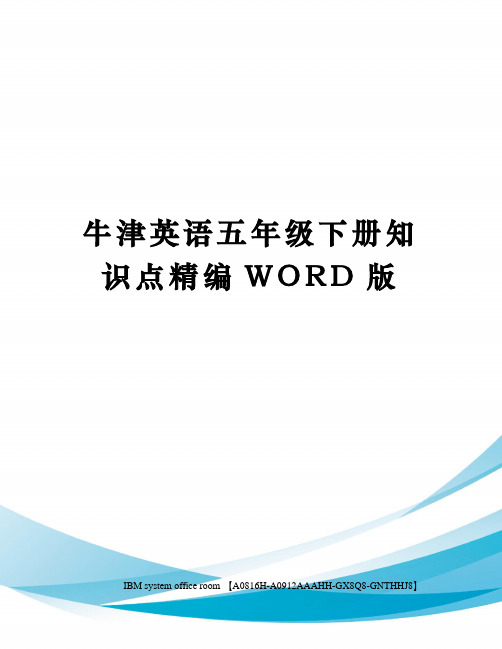
牛津英语五年级下册知识点精编W O R D版 IBM system office room 【A0816H-A0912AAAHH-GX8Q8-GNTHHJ8】M o d u l e1U s i n g m y f i v e s e n s e sUnit1 What a mess生词:notebook paints crayon school bag tape glue brush音标:Whose...?It’smine/yours/his/hers/ours/theirs.They’re...Unit2 Watch it grow生词:caterpillar butterfly chick chicken duckling duck puppy dog音标:语法:...was/were...Unit3 How noisy生词:drill lorry bus car motorbike音标:语法:...did...Module2 My favorite thingsUnit1 Food and drinks生词:Meat: pork beef chicken fishVegetables: tomatoes potatoes carrots cabbages beansFruit: apples oranges bananas grapesStaple Food: rice noodles breadDrinks: juice water milk tea音标:What didyou havefor...?I had...Unit2Film生词:ticketticket office entrance exit seat音标:语法:Shall we...Unit3 school subject生词:Chinese English Maths Art Music IT PE 音标:语法:It’s time for...Module3 Things around usUnit1 Signs生词:telephone toilet restaurant exit entranceNo smoking No swimming Don’t litter Don’t walk on the grass音标:What does this signsay/mean?It says/means we can/can’t/mustn’t/shouldn’t..Unit2 Weather生词:Cloud/cloudy sun/sunny rain/rainy wind/windysnow/snowy storm/stormy fog/foggy 30℃/thirty degrees音标:语法:What ’s the weatherlike? What ’s the temperature?It ’s...(weather).It ’s...(temperature).Unit3 Changes生词:Cupboard bookshelf bed mirror lamp cushion sofa音标:语法:What canwedo?Module4 More things to learnUnit1 Museum生词:Science museum art museum history museum Insect museum car museum railway museum语法:Which museum do you want to visit?I want to visit ...Why?Because...Unit2 Western holiday生词:Christmas Easter Halloween Thanksgiving 语法:When is ...?It’s on ...What do people do on this holiday?Unit3 story time生词:giant castle。
(word完整版)牛津英语五年级下册知识点整理,推荐文档
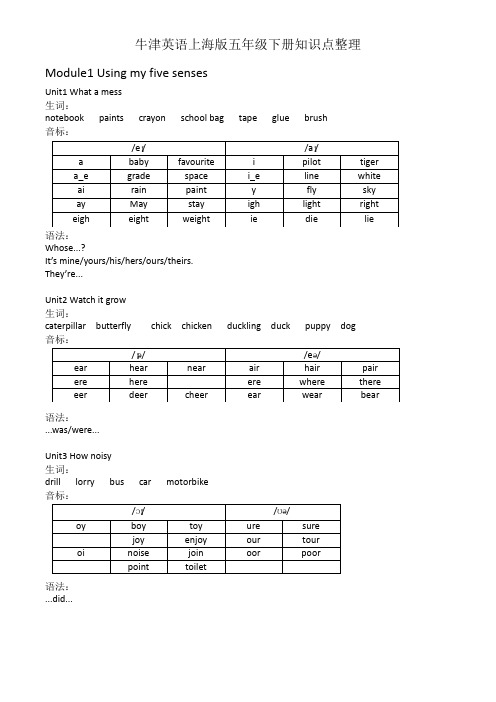
Module1 Using my five sensesUnit1 What a mess生词:notebook paints crayon school bag tape glue brush音标:语法:Whose...?It’s mine/yours/his/hers/ours/theirs.They’re...Unit2 Watch it grow生词:caterpillar butterfly chick chicken duckling duck puppy dog 音标:语法:...was/were...Unit3 How noisy生词:drill lorry bus car motorbike音标:语法:...did...Module2 My favorite thingsUnit1 Food and drinks生词:Meat: pork beef chicken fishVegetables: tomatoes potatoes carrots cabbages beans Fruit: apples oranges bananas grapesStaple Food: rice noodles breadDrinks: juice water milk tea音标:语法:What did you have for...?I had...Unit2 Film生词:ticket ticket office entrance exit seat音标:Shall we...Unit3 school subject生词:Chinese English Maths Art Music IT PE音标:It’s time for...Module3 Things around usUnit1 Signs生词:telephone toilet restaurant exit entranceNo smoking No swimming Don’t litter Don’t walk on the grass 音标:语法:What does this sign say/mean?It says/means we can/can’t/mustn’t/shouldn’t..Unit2 Weather生词:Cloud/cloudy sun/sunny rain/rainy wind/windysnow/snowy storm/stormy fog/foggy 30℃/thirty degrees音标:语法:What’s the weather like? What’s the temperature?It’s...(weather).It’s...(temperature).Unit3 Changes生词:Cupboard bookshelf bed mirror lamp cushion sofa 音标:语法:What can we do?Module4 More things to learnUnit1 Museum生词:Science museum art museum history museum Insect museum car museum railway museum 语法:Which museum do you want to visit?I want to visit ...Why?Because...Unit2 Western holiday生词:Christmas Easter Halloween Thanksgiving 语法:When is ...?It’s on ...What do people do on this holiday?Unit3 story time生词:giant castle。
新沪教牛津版五年级下册小学英语全册单元知识点小结
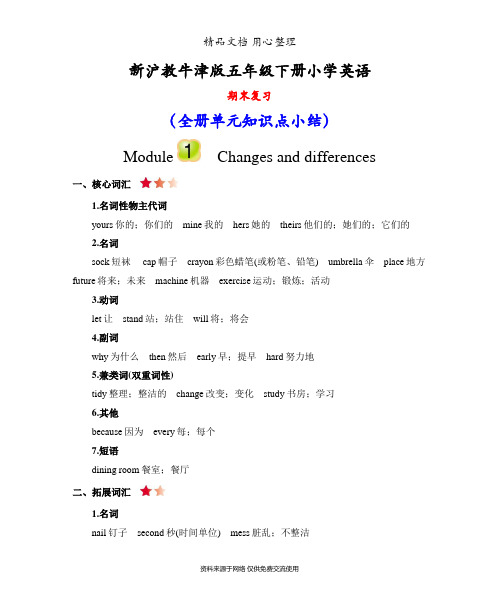
新沪教牛津版五年级下册小学英语期末复习(全册单元知识点小结)Module Changes and differences一、核心词汇1.名词性物主代词yours你的;你们的mine我的hers她的theirs他们的;她们的;它们的2.名词sock短袜 cap帽子crayon彩色蜡笔(或粉笔、铅笔)umbrella伞place地方future将来;未来machine机器exercise运动;锻炼;活动3.动词let让stand站;站住will将;将会4.副词why为什么then然后early早;提早hard努力地5.兼类词(双重词性)tidy整理;整洁的change改变;变化study书房;学习6.其他because因为every每;每个7.短语dining room餐室;餐厅二、拓展词汇1.名词nail钉子second秒(时间单位)mess脏乱;不整洁2.动词drop使落下;掉落stick粘贴;粘住3.形容词enough足够的more更多的4.副词twice两次easily容易地5.兼类词(双重词性)north北方;向北south南方;向南6.短语tidy up把……整理好(be) full of装满……;充满…… a few几个;一些wild goose大雁(复数wild geese) in the future将来in front of在……前面take a photo拍照wear glasses戴眼镜(be)weak in不擅长not … any more不再all day 一天到晚do exercise做运动三、核心句型1.— Are they yours?它们是你的?— No, they aren’t. 不,它们不是。
解读: 问句是一个一般疑问句,用来询问某物的归属,有肯定和否定两种回答。
举一反三: — Are these crayons yours?这些蜡笔是你的吗?— No, they aren’t. 不,它们不是。
上海牛津英语五年级下册语法点

上海牛津英语五年级下册语法点Document serial number【NL89WT-NY98YT-NC8CB-NNUUT-NUT108】上海牛津英语五年级下册语法点整理动词的形式:一、动词后面加上ing:①、现在进行时:表示某个动作正在发生或进行。
它的构成方式是:主语+be+动词ing〔现在分词〕形式,有时会要求自己加上be动词(is,am,are)。
句子中经常会出现look,listen,now……等词。
现在进行时的变化肯定句式:主语+be(am,is,are)+动词ing+其它.否定句式:主语+be(am,is,are)+not+动词ing+其它.一般疑问句:Be(am,is,are)+主语+动词ing+其它?特殊疑问句:疑问词(what,where…)+be(am,is,are)+主语+动词ing+其它?对现在进行时的特殊疑问句的回答,它不可以用Yes或No直接作答,要根据实际情况回答。
练习:1.Whatareyou_________(do)nowI___________(eat)bread.2.It’snineo’clock..Myfather_______________(work)intheoffice.3.Look,theboy____________(put)theplateonhisfinger.4.__________he__________(clean)theclassroomNo,heisn’t.He____________(play).5.WhereisMakHe___________(run)onthegrass.6.Listen,who___________(sing)inthemusicroomOh,Mary___________(sing)there.②like(s),go,dosome,后面的动词加ing.如:1.Ilike(play)football,butmyfatherlikes(play)chess.2.Let’sgo(swim).二、动词后面加s/es.这就有关一种时态:一般现在时。
(完整)上海牛津小学英语语法知识总结,推荐文档

② 不含 be 动词或情态动词的, 行为动词前要用助动词的否定式 ( don ’,tdoesn ’,tdidn ’),t 后面跟动词的原形。
He likes drawing pictures. — >He doesn ’ t like drawing pictures. I went to the park yesterday. — >I didn ’ t go to the park yesterday.
如: I am a student. He is Jim’s father. They are from Japan.
2 )当谓语是 行为动词 时,一般现在时的构成: ① 主语 (非第三人称单数) +动词原形+其他 如: I often watch TV at the weekends. Mr Green and Mrs Green like collecting stamps. ② 主语 (第三人称单数) +动词的第三人称单数形式+其他 如: Jim usually visits his grandparents on Sundays. She sometimes goes to the park with her mother.
They will go swimming this afternoon.
They will not(won ’ t) go swimming this afternoon.
— Will they go swimming this afternoon? — Yes, they will . / No, they won’t.
begin-beginning , jog-jogging , forget-forgetting
4 、动名词 其实就是动词的现在分词, 它既有名词性质 (可作主语) ,又有动词性质 (可带宾语) 。 如: Asking the way My hobby is collecting stamps. He is good at skating.
牛津沪教版小学英语五年级下册知识点总结
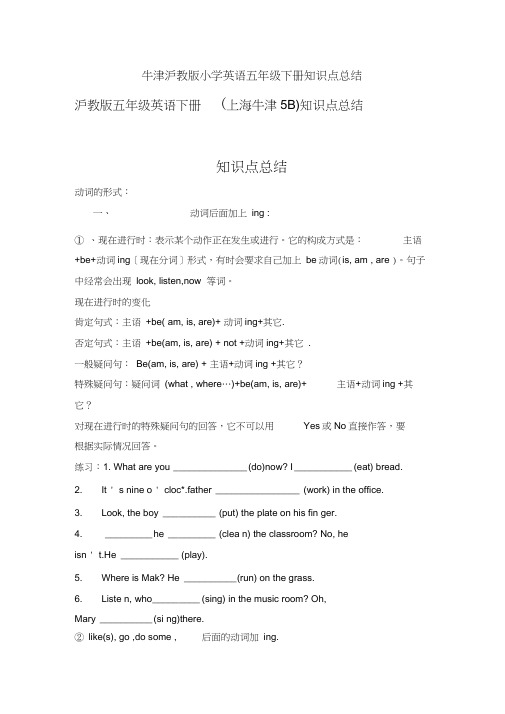
牛津沪教版小学英语五年级下册知识点总结沪教版五年级英语下册(上海牛津5B)知识点总结知识点总结动词的形式:一、动词后面加上ing :①、现在进行时:表示某个动作正在发生或进行。
它的构成方式是:主语+be+动词ing〔现在分词〕形式,有时会要求自己加上be动词(is, am , are )。
句子中经常会出现look, listen,now 等词。
现在进行时的变化肯定句式:主语+be( am, is, are)+ 动词ing+其它.否定句式:主语+be(am, is, are) + not +动词ing+其它.一般疑问句:Be(am, is, are) + 主语+动词ing +其它?特殊疑问句:疑问词(what , where…)+be(am, is, are)+ 主语+动词ing +其它?对现在进行时的特殊疑问句的回答,它不可以用Yes或No直接作答,要根据实际情况回答。
练习:1. What are you ______________ (do)now? I ___________ (eat) bread.2. It ' s nine o ' cloc*.father ________________ (work) in the office.3. Look, the boy __________ (put) the plate on his fin ger.4. _________ he _________ (clea n) the classroom? No, heisn ' t.He ___________ (play).5. Where is Mak? He __________ (run) on the grass.6. Liste n, who _________ (sing) in the music room? Oh,Mary __________ (si ng)there.②like(s), go ,do some , 后面的动词加ing.如:1.1 like (play ) football, but my father likes (play) chess.2. ____________ Let ' s go wim).二、动词后面加s/es.这就有关一种时态:一般现在时。
沪教版小学牛津英语五年级下册 考前必背单词和知识点
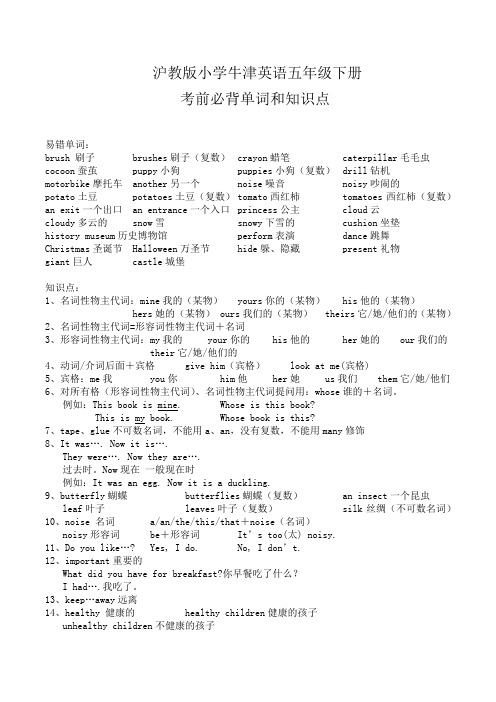
沪教版小学牛津英语五年级下册考前必背单词和知识点易错单词:brush 刷子brushes刷子(复数)crayon蜡笔caterpillar毛毛虫cocoon蚕茧puppy小狗puppies小狗(复数)drill钻机motorbike摩托车another另一个noise噪音noisy吵闹的potato土豆potatoes土豆(复数)tomato西红柿tomatoes西红柿(复数)an exit一个出口an entrance一个入口princess公主cloud云cloudy多云的snow雪snowy下雪的cushion坐垫history museum历史博物馆perform表演dance跳舞Christmas圣诞节Halloween万圣节hide躲、隐藏present礼物giant巨人castle城堡知识点:1、名词性物主代词:mine我的(某物)yours你的(某物)his他的(某物)hers她的(某物) ours我们的(某物)theirs它/她/他们的(某物)2、名词性物主代词=形容词性物主代词+名词3、形容词性物主代词:my我的 your你的his他的her她的 our我们的their它/她/他们的4、动词/介词后面+宾格give him(宾格)look at me(宾格)5、宾格:me我you你him他her她us我们them它/她/他们6、对所有格(形容词性物主代词)、名词性物主代词提问用:whose谁的+名词。
例如:This book is mine. Whose is this book?This is my book. Whose book is this?7、tape、glue不可数名词,不能用a、an,没有复数,不能用many修饰8、It was…. Now it is….They were…. Now they are….过去时。
Now现在一般现在时例如:It was an egg. Now it is a duckling.9、butterfly蝴蝶butterflies蝴蝶(复数)an insect一个昆虫leaf叶子leaves叶子(复数)silk丝绸(不可数名词)10、noise 名词a/an/the/this/that+noise(名词)noisy形容词be+形容词It’s too(太) noisy.11、D o you like…?Yes, I do. No, I don’t.12、important重要的What did you have for breakfast?你早餐吃了什么?I had….我吃了。
- 1、下载文档前请自行甄别文档内容的完整性,平台不提供额外的编辑、内容补充、找答案等附加服务。
- 2、"仅部分预览"的文档,不可在线预览部分如存在完整性等问题,可反馈申请退款(可完整预览的文档不适用该条件!)。
- 3、如文档侵犯您的权益,请联系客服反馈,我们会尽快为您处理(人工客服工作时间:9:00-18:30)。
上海牛津英语五年级下册语法点整理
动词的形式:
一、动词后面加上ing :
①、现在进行时:表示某个动作正在发生或进行。
它的构成方式是:主语+be+动词ing〔现在分词〕形式,有时会要求自己加上be动词(is, am , are )。
句子中经常会出现look, listen, now……等词。
现在进行时的变化
肯定句式:主语+be( am, is, are)+动词ing+其它.
否定句式:主语+be(am, is, are) +not +动词ing+其它.
一般疑问句:Be(am, is, are) +主语+动词ing +其它?
特殊疑问句:疑问词(what , where…)+be(am, is, are)+主语+动词ing +其它?对现在进行时的特殊疑问句的回答,它不可以用Yes或No直接作答,要根据实际情况回答。
练习:1. What are you _________(do) now? I ___________(eat) bread.
2. It’s nine o’clock.. My father_______________(work) in the office.
3. Look, the boy____________(put) the plate on his finger.
4. __________he__________(clean) the classroom? No, he isn’t. He____________(play).
5. Where is Mak? He___________(run) on the grass.
6. Listen, who___________(sing) in the music room? Oh, Mary___________(sing) there.
②like(s), go , do some , 后面的动词加ing.
如:1. I like (play ) football, but my father likes (play) chess.
2.Let’s go (swim).
二、动词后面加s/es. 这就有关一种时态:一般现在时。
一般现在时:表示经常性的事情。
时间状语:often经常, usually通常, always总是,every每个, sometimes有时,
at…在几点钟
它的动词变化与主语人称有关,只有肯定句中第三人称单数用动词三单(动词加s/es),其余动词均用原形。
在否定句和问句中,因为有助动词do, don’t , does , doesn’t,所以后面的动词用原形。
三单变化:多数在动词后加s play—plays like—likes
以s,x,sh,ch,o结尾的动词加es go—goes wash—washes watch--watches
以辅音字母加y结尾,把y改i再加es fly—flies study—studies
一般现在时的变化:
1、肯定句:主语(非三单)+动原+其它/ 主语(he , she )+动词三单+其它。
2、否定句:主语(非三单)+don’t+动原+其它/ 主语(he , she )+动原+其它。
3、一般疑问句:Do +主语(非三单)+动原+其它/ Does +主语(he, she )+动原+其它。
4、特殊疑问句:特殊疑问词(What, Where …)+do +主语(非三单)+动原+其它
特殊疑问词(What, Where…)+ does +主语(he , she )+动原+其它。
练习:1. We often___________(play) in the playgound.
2. He _________(get) up at six o’clock.
3. __________you _________(brush) your teeth every morning?
4. What (do) he usually (do) after school?
5. Danny (study) English,Chinese,Maths,Science and Art at school.
6. Mike sometimes __________(go) to the park with his sister.
7. At eight at night, she __________(watch) TV with his parents.
8. ________ Mike________(read) English every day?
9. How many lessons_________your classmate________(have) on Monday?
10. What time_________his mother_________(do) the housework?
11. What you usually (do ) on Sundays ?
12. He ( not like ) ( drink ) tea .
13. They (not like ) ( play ) cards.
三、动词用原形的名显特征有:1、在can , can’t, let’s , shall we 后面用原形。
2、助动词do , don’t , does , doesn’t 后面动词用原形。
练习:1、He can ( put ) an egg on his mouth .
2. Let’s ( clean ) the library now.
3. Shall we (have ) lunch at eleven o’clock?
4. Does your uncle (water) flowers every day ?
总练习:用所给动词的适当形式填空:
1. Wang Bing is (write) an e-mail to his friend in the study.
2. I (play) the piano, my brother (watch) TV now.
3.He can (swim), but I (not),I can (ski).
4.Let’s (go) and (play) basketball .
5.Shall we (clean) the classroom now.
6.I (like) (skate),my parents (not),they (like) (swim).
7.Miss Green (like) (dance) very much.
8. (do) Uncle Wang (run) fast?
9.GaoShan often (go) (swim) in Summer(夏天).
10.Do you (have) (some) (bobby)? Yes, I (do).
11 (do) your father (watch) TV in the evening?No, he (not).
12.This is Helen (speak).
13.Tom usually (play) football after school.
14.He (live) in a small town near Nanjing.
15.Pingping (write) an e-mail to his friend now.
16.What (do) Nancy usually (do)? She usually (grow) flowers .
17. My father ___ __(like) that song very much. He often ___ __(sing) it.
18. ________he ________(watch) TV in the evening? No, he ________
19. My parents usually________(get) up at 6. My sister _______(get) up at 6:15, and I usually _________(get) up at 6:30
20. _______your father _______(fly) kites over there now? Let me see. Yes, he ______. He often ________(fly) kites there. Shall we ______(go) to have a look?
21. My aunt (not like ) ( cook ).。
